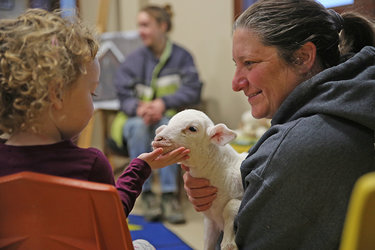Emily Vincent in Berne carries forward the sheep line developed by a Texas rancher
BERNE — Emily Vincent is carrying on a legacy.
A sheep farmer in Berne, Vincent had a brain tumor removed in January of 2020.
“After I got out of my surgery, I had just the most horrendous vertigo that you could ever have,” recalls Vincent in this week’s Enterprise podcast. “It was really hard.”
Vincent, a registered nurse, had regularly commuted to New York City where she worked in intensive-care units.
Now, she couldn’t stand up for long. “When I stood up, I was teetering. I looked like I was perpetually drunk. I couldn’t drive, so I couldn’t get down to my job in New York City.”
A strong woman, Vincent found it hard to accept limitations. “I wanted to go and help my fellow nurses, like I wanted to be down there in the thick of things. I wanted to help COVID patients,” she said.
Instead, she was doing physical therapy three times a week for two years and relying on her optimism as a farmer. When she hit a low point in March of 2021, a good friend of hers, Vicky, who lives in Texas, urged her to visit.
Vicky said, “I will drive you around to all these sheep farms and we’ll go look at sheep together.”
With the vertigo, it took Vincent a long time to board the plane but she made it, and visited sheep farms with her friend. “I really wanted to find a ewe to start another line on my property,” Vincent said of the Dorpers she breeds and raises on her Two Rock Ranch in Berne.
Although she now has about 300 sheep, Vincent had started raising sheep almost accidentally when she lived in California. A roommate who worked for filmmaker George Lucas said Lucas had some sheep he wanted to give away. That breed was flighty and Vincent discovered Dorpers, a breed from South Africa bred for meat.
“I got into White Dorpers because I just thought they were just so pretty,” she said. “And they just look you in your eyes.”
Dorpers, Vincent explained, were bred by the South African government when farmers there were having trouble raising and exporting reliable meat. The name comes from the two breeds that were crossed: Dorset and Persian sheep.
It’s a hardy breed, Vincent said, with strong parasite resistance. “They’re very good moms …. And they’re just excellent foragers,” said Vincent. She also said, “It’s one of the best meat breeds around because they have very quick weight gain.”
Some of the first farmers in the United States to get Dorpers were Texans, Vincent said, because the climate is a lot like South Africa and so is the need to forage.
Vincent said of sheep that she wants to breed and raise, “It’s kind of like meeting the person of your dreams and you just know when you see them. And that’s how it is for me and sheep — I just know.”
On Vincent’s 2021 Texas trip, she and her friend visited nine or 10 ranches and Vincent did not find the ewe of her dreams.
Right before the last day of her trip, Vincent told her friend, “I’m done. I don’t want to go look at more sheep.”
“No,” her good friend responded. “You came down here. We’re going to do it. We’re going to go to one more farm or ranch, so pick one and we’re going tomorrow.”
Vincent chose one that was just 10 minutes from their hotel — the Yucca Lily Ranch. She called the night before and Mike and Jean Sudderth answered the phone simultaneously and said she could visit the next day.
They welcomed her visit although Mike cautioned, “I have nothing for sale though.”
Finding the ranch “in the middle of nowhere” with “weird directions” like “turn at the big cactus” left the visitors temporarily lost.
“We finally found a dusty little ranch. It was very pretty, though …,” recalled Vincent. “The car hadn’t even stopped and I was opening the door to get out …. It was instantaneous, true love.”
Mike was there — 6 feet, 4 inches tall, skinny as a rail, wearing a huge cowboy hat.
“He came up to me and he put his arm around me and I looked at the sheep and he said, ‘Aren’t they beautiful?’ And I looked up at him and I had tears running down my face and he had tears running down his face. And we both cried over sheep together and that’s how we met.”
Mike Sudderth is in his nineties and Vincent is half his age. Mike said, “We were meant to meet.”
He wanted to retire and his children, with far-flung careers of their own, weren’t interested in raising sheep.
“His whole life was built around these sheep,” said Vincent, “and he really didn’t want to let them go until he had the right person to pass them on to.”
Emily Vincent was that person.
Vincent shared a brief synopsis of the Sudderths’ decades-long quest in creating the Yucca Lily line.
Mike Sudderth, a doctor, got his medical training as a young man in the Army. He got a compassionate leave to be near his family at Fort Hood because his parents were very sick; his parents died when he was 27.
He and his wife then went to Germany for a few years to repay his student loan with the Army, but did have cattle on the ranch that he had inherited in Texas. When they finally moved back, he started his practice in Dallas and, as his retirement approached at the end of the last century, Mike and Jean Sudderth became interested in raising sheep.
The Sudderths got their first Dorpers from Canada but that market then closed because of disease. Eventually, the couple made repeated trips to South Africa and Australia where they became close friends with breeders in both places.
They got genetic material from Raymond Read, one of the foremost South African Dorper judges and educators in the world, and embryos from the selected ewes were sent from South Africa to Adrian Veitch in Australia who grew them.
Explaining the reason for the intricate international maneuvers, Vincent said, “From some countries, you can bring embryos and semen. In other countries, you cannot.”
After those lambs, grown from African embryos in Australian sheep, grew into ewes, they were then flushed by Adrian and the resulting embryos were sent to Mike, true to Adrian’s promise. Adrian got to keep the resulting ewe lambs that he flushed.
Mike was expecting 110 embryos from Adrian but received 199. “How honest is that?” asked Vincent. “He could have kept them and not said anything, but he sent them everything.”
Mike bought Adrian a John Deere Gator as a thank-you and the sheep turned out to be the best White Dorpers outside of South Africa, Vincent said.
“So now there’s no more genetic basis for the Yucca Lily in South Africa,” she said. “So it’s basically a closed line now. And that’s why it’s so valuable.”
Last year, Vincent had the top-selling ewe lamb in the United States through the flock she got from the Sudderths. The lamb was sold at auction for $10,500 to Bill and Diane Moy in California.
“I think Mike would agree that he left me a legacy,” said Vincent. “And it’s something that I really cherish because this is his whole life’s work, and it’s continuing on.”
Vincent spoke of the importance, as farmers age, of carrying on their work.
“Hopefully, when it’s my turn,” she concluded, “I can pass it on to somebody that comes and cries over my sheep.”


